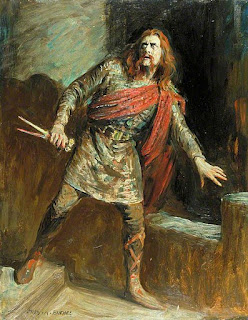Tomorrow, and Tomorrow, and Tomorrow
The United Nations Framework Convention on Climate Change came into force on Monday 21 March 1994.
On 12 March 1994, a 1934 photograph claimed to be of the Loch Ness Monster had finally been confirmed as a hoax.
Since 1994, unfairly powerful politicians around the world have mistaken one event for the other.
How do you assess claims about monsters?
How do you assess the meaning and practice of force, particularly in the international context?
How do you assess claims about days of the week and times of the year?
How do you assess the cultural meanings of Halloween, in poetry and prose?
How do you assess the cultural meanings of tomorrow, in poetry and prose?
Tomorrow will be Samhain in Celtic mythology. The separation between the world of ordinary mortals and the Celtic Otherworld was stated to be weakened and liminality deepened at Samhain.
Will Celtic deities influence the outcome of COP26?
How will various weather gods and sovereignty goddesses influence the outcome?
Who will ignore the history of engineering and make promises mostly associated with mythology and science fiction?Who will act as if fixing global warming requires nothing more from politicians than faith healing?
Who will confuse the Gaels and the Gauls?
Who will call upon the Cailleach for advice?
Who will interpret destiny entirely egocentrically?
How do you interpret weather lore?
What do you know about the Curse of Scotland?
Perhaps you have been seeking advice from the bean-nighe, the washerwoman.
Perhaps you have sought assistance from the Cernunnos or another horned god.Perhaps you have been learning from the Morrígan and the Dagda and Cú Chulainn.
Perhaps you have been consulting Enheduanna and/or Inana.
Perhaps you have been consulting the Slinneanachd or a Chinese oracle bone or a traditional southern African healer or a wellness influencer or a fossil fuels lobbyist or the ecomafia.
But who will you be consulting tomorrow, and why?Who has been consulting you, and for what reasons?
How have you been assessing the influence of scapulimancy and pyromancy and private equity and venture capital and Chinese fortune telling.
How have you been assessing the influence of petrochemicals and various fuels?
How do you usually think about tomorrow, and tomorrow, and tomorrow?
On 12 February 1994, the 1893 version of Edvard Munch's The Scream was stolen from the National Gallery of Norway in Oslo. It was recovered on 7 May of that year.
On 3 February 1988, the 1895 version of Munch's Love and Pain was stolen from the Munch Museum in Oslo and recovered in the same year.What will you value tomorrow?
Will you value nature?
Will you value human feelings?
Will you value evidence of Bronze Age political divination?
Will you value Chinese oracle bone script?
Will you value The Tragedy of Macbeth at all?
What value do you place on Munch's works, whether aesthetically or financially or otherwise, and why?
What value do you place on high-revenue corporations, and why?
What value do you place on privacy, and why?
What value do you place on liminality, and why?
You may associate liminality with transitional arrangements in relation to care and health and illness and death.
Do you pronounce Seyton as See-tun or Say-tun?
Have you ever performed a soliloquy as Macbeth?
Have you ever thought deeply about meanings?








Comments
Post a Comment